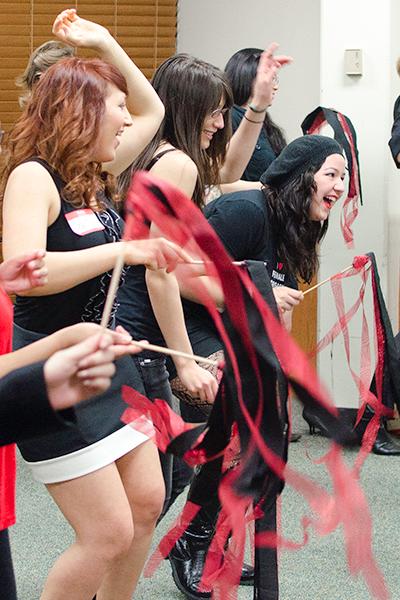?Vagina Monologues? raise awareness for female health

Vagina Monologues:The Vagina Monologues cast strikes a pose at rehearsal in the University Union on Friday.:Robert Linggi – State Hornet
February 16, 2011
The lights are turned down low and all eyes are on the parade of women up on stage, each baring herself for all to see. What is going on here?
Don’t be mislead! This is Sacramento State’s performance of feminist playwright Eve Ensler’s award-winning play “The Vagina Monologues.”
Student Health Services,Women’s Resource Center and PRIDE Center are hosting three performances of the play in the University Union Feb. 17, 18 and 19.
These performances are in observance of V-Day, a global activist movement that aims to end violence against women and girls. According to V-Day.org, the ‘V’ in V-Day stands for Victory, Valentine and Vagina. Since its inception, V-Day has spread to 130 countries, raised $80 million and reached more than 300 million people. This global campaign aims to “(generate) broader attention for the fight to stop violence against women and girls, including rape, battery, incest, female genital mutilation (FGM) and sex slavery.”
V-Day is annually observed across college campuses, inviting groups to get creative in raising funds and awareness about these issues. The main attraction on campuses involved in this campaign is the performance of Ensler’s play. Jessica Heskin, coordinator for Violence and Sexual Assault Support Services in the Well, said Ensler made her play available to college campuses in 2000.
“We were permitted to do three shows without paying royalties if we raised money for a “violence against women’ cause. So, we saw it as an excellent way to involve our campus community in this endeavor and to raise money for the Violence and Sexual Assault Support Services program,” Heskin said.
The benefit production of this event also helps raise funds for the SHARE Institute and the Women’s Resource Center. Ten percent of its profits go to V-Day’s campaign in Haiti, a country that commonly practices FGM on its young girls.
Elizabeth Rowell, director of the play and psychology graduate student, said The Vagina Monologues began when Ensler interviewed hundreds of women about their relationships with their vaginas and how their genitalia have impacted their lives, relationships and the way they view themselves. Rowell stresses the importance of the messages in the monologues.
“We hope to send the message to women that they do not all have to look a certain way, act a certain way or all have the same experiences in ordered to be considered of worth or value. It’s about sexual and personal freedom that women have and need to gain more of and it just so happens to have a strong relationship to what happens between their legs,” Rowell said.
The focus of each monologue somehow relates to issues involving the vagina, such as orgasm, rape, menstruation and birth. Through victory from adversity as a woman, the play aims to remind women that the vagina is meant to empower and embody individuality; therefore, each monologue has its own story, tone, emotion and message.
From triple orgasms and getting your first period to reclaiming the connotation of the word “cunt,” every performance will enthrall the audience while delivering an important message. Rowell especially loves the script and message in the monologue entitled, “The Woman Who Liked to Make Vaginas Happy.”
“I love it because it tells the story of a strong woman who loves to hear the pleasure that she provides other women. How erotic is that?” Rowell said.
What about the audience members with penises? The word “vagina” and the promise of belly laughs tend to easily convince a man to tag along.
“Every year some men attend, love the show, and then their friends try to get tickets and we are sold out. If you have ever loved a woman or cared for a woman, this play is for you,” Heskin said.
The actresses in the show are excited to be working on such an important event. Twenty-two Sac State women will be performing the monologues, all of them having their own motivation for participating.
“Some had seen the show previously and loved the message, some were just interested in a play that had the word ‘vagina’ in it, some had been in previous shows, and some had personal experiences that made them feel as though they had a personal connection with certain monologues,” Rowell said.
Rowell said she hopes that the women who attend will allow themselves to “recognize that other women have had their same doubts, questions, experiences, etc. and that we can all find humor and tears in things that affect us but may seem small at the time.”
Heskin is looking forward to the various effects this performance will have on those who fill the seats.
“I’m hoping the audience gets some laughter, some learning and some compassion and empowerment,” Heskin said.
Kayla Oliverio can be reached at [email protected]





















































































































